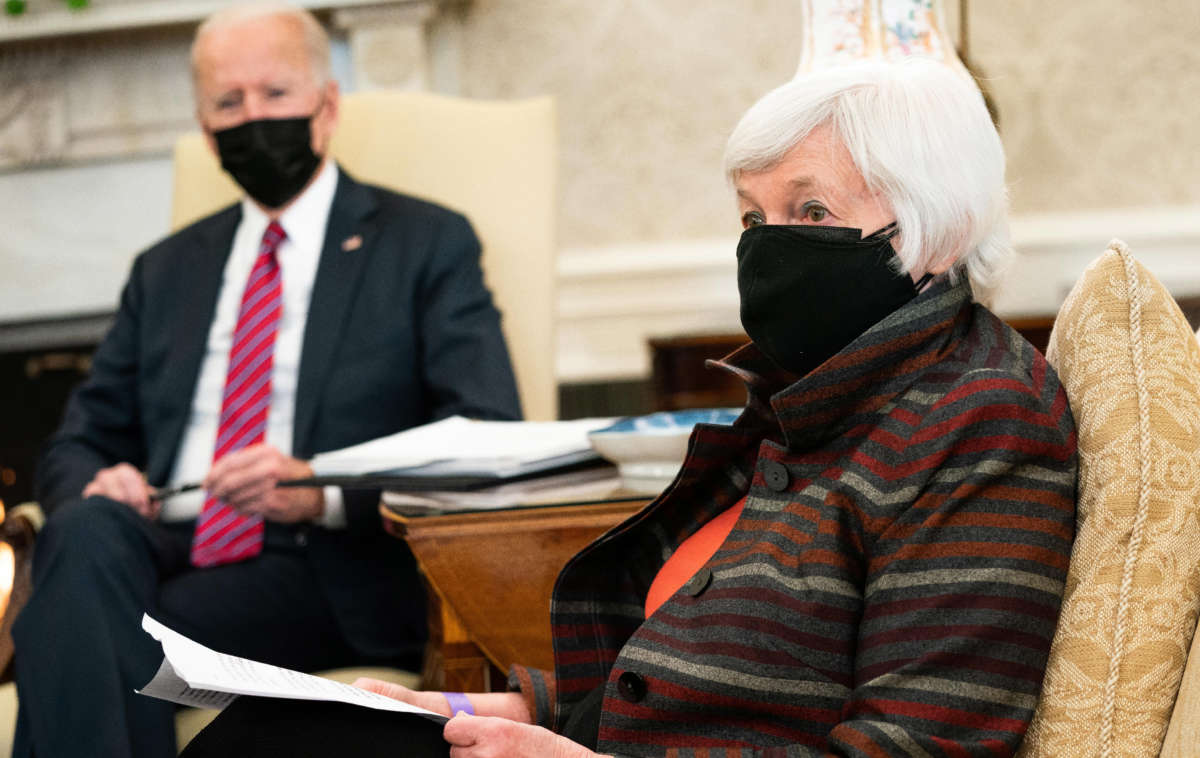The Treasury Department released a plan on Wednesday detailing President Joe Biden’s proposed corporate tax raises to help pay for his infrastructure plan. It estimates that Biden’s tax hikes will raise about $2.5 trillion for the government over the next decade.
The president has proposed raising the corporate tax rate from 21 to 28 percent and ending fossil fuel subsidies in favor of funding clean energy production, among other proposals. The Treasury says in its plan that it hopes to end the global “race to the bottom” to lure corporations with low taxes.
Under the new plan, “America will compete on our ability to produce talented workers, cutting-edge research and state-of-the art research, not on whether we have lower tax rates than Bermuda or Switzerland,” said Treasury Secretary Janet Yellen in a call with reporters. Yellen has also been working recently on pushing for a global minimum tax rate for corporations to end the practice of companies going abroad for tax havens.
“Our tax revenues are already at their lowest level in generations,” Yellen said. “If they continue to drop lower, we will have less money to invest in roads, bridges, broadband and R&D.” The administration says that the revenue raisers will be enough to pay for the entire infrastructure bill.
Donald Trump had previously slashed the corporate tax rate from 35 percent to 21 percent. Though Biden’s plan restores only part of the previous rate, it’s still been met with opposition from Republicans and moderate Democrats.
Meanwhile, progressives say that the tax raises ought to be even more ambitious. Though Sen. Bernie Sanders (I-Vermont) hasn’t directly criticized Biden’s plan — perhaps because of the two politicians’ close working relationship — he has offered a corporate tax hike of his own to restore the 35 percent corporate tax threshold. Previous tax plans laid out by Sanders have also proposed much higher taxes on the wealthy than Biden’s plan.
Sanders and other progressives like Sen. Elizabeth Warren (D-Massachusetts) have also introduced bills with additional revenue generators like raising the estate tax and a wealth tax on the ultra-rich, which progressives say could help close the wealth gap that’s only grown starker throughout the pandemic.
The politicians also tout the ability of legislation to make corporations and the wealthy pay their fair share. Over the years, companies like Amazon have been able to successfully use loopholes that allow corporations to dodge taxes. Those loopholes, a recent report found, allowed 55 companies to pay zero dollars in income tax on their 2020 profits. On the 2020 presidential campaign trail, Warren also released a “real corporate profits tax” plan that would target companies that dodge taxes.
Large corporations, meanwhile, have come out in favor of Biden’s tax hike. Jeff Bezos said on Tuesday that Amazon is in favor of the tax raise. But corporations often release such statements to bolster their public image. Amazon is especially sensitive to its image right now after recent news that the company sets impossibly high quotas for its drivers, which forces them to urinate in bottles to stay on schedule. Amazon has also infamously been the face of companies paying zero income taxes in the past.
Companies coming out in favor of the tax hikes are likely hedging their bets on the fact that Biden’s infrastructure plan and corresponding tax hikes are widely popular. A new poll has shown that 73 percent of voters are supportive of the plan, with 57 percent of Republicans and 93 percent of Democrats. Those on the left say that the wide popularity of the bill is evidence that Biden could go even bigger with his plan.
Along with proposing legislation to expand the tax hikes, progressives in Congress have also criticized the infrastructure plan for being too limited. Sanders and Rep. Alexandria Ocasio-Cortez (D-New York) have said that the plan should be larger and be more ambitious in addressing the climate crisis in particular. Meanwhile, other progressives like Sen. Ed Markey (D-Massachusetts) have unveiled a $10 trillion plan to address infrastructure concerns, tackle the climate crisis and further the cause of social justice.
Some say, however, that thinking about raising tax revenue as the only way to expand the capacity of the government to spend and develop the country is flawed. Stony Brook University economist Stephanie Kelton wrote in The New York Times that Biden can and should go bigger with his infrastructure plan and not limit himself by capitulating to politicians asking how the legislation can be paid for.
“By focusing on how much revenue they think they can raise from a broad array of tax increases on the well-off, Democrats risk allowing the scope of their ambitions to be governed by the dated framework of fiscal responsibility in Washington and the political appetite for tax increases, rather than what is truly possible based on logistics in the real economy,” wrote Kelton.
Join us in defending the truth before it’s too late
The future of independent journalism is uncertain, and the consequences of losing it are too grave to ignore. We have hours left to raise the $12,0000 still needed to ensure Truthout remains safe, strong, and free. Every dollar raised goes directly toward the costs of producing news you can trust.
Please give what you can — because by supporting us with a tax-deductible donation, you’re not just preserving a source of news, you’re helping to safeguard what’s left of our democracy.
